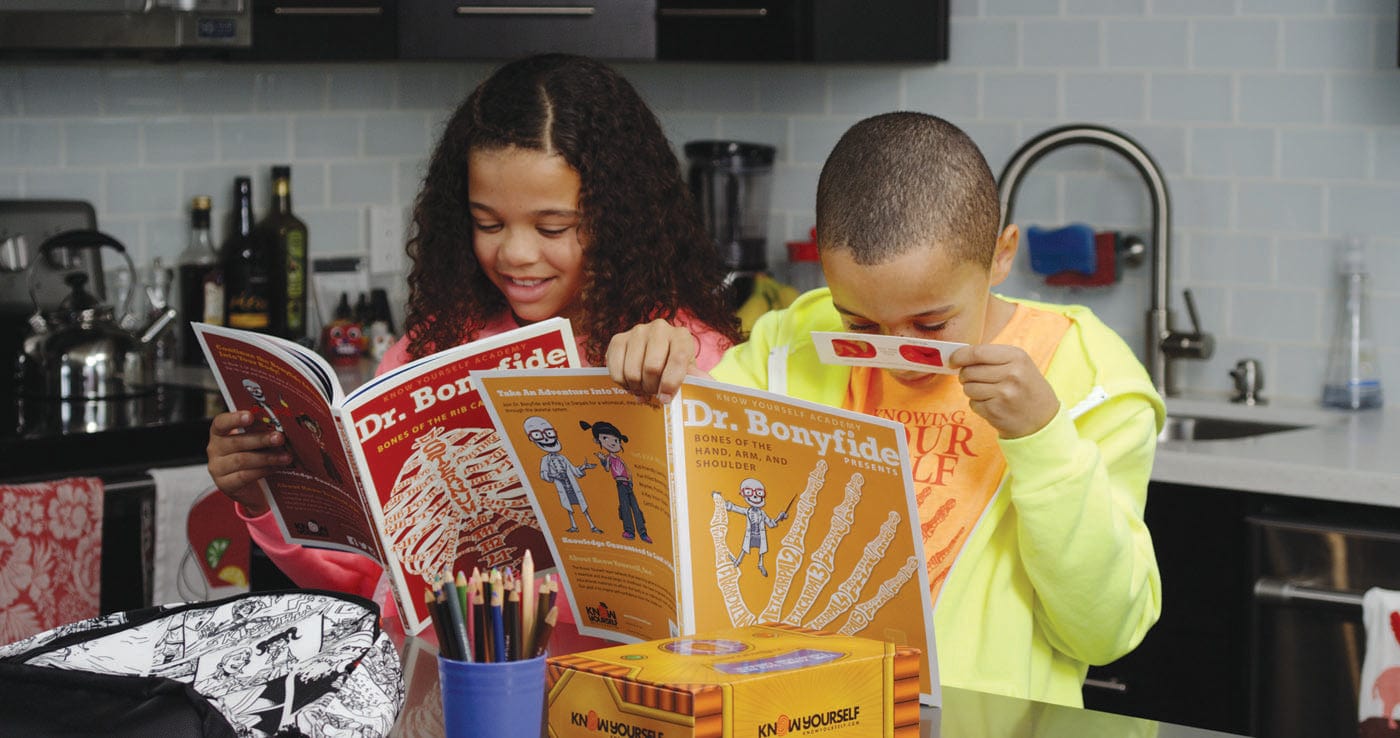
Hello to all you adventure boos and ghouls! It’s your skeleton friend, Dr. Bonyfide, ready to answer all your eerie queeries. As I’m sure you’ve noticed, autumn is upon us, and this round of questioning falls on Halloween! In the spirit of the season, you sent in a bunch of creepy questions -- I never knew you s-cared so much! -- but I could only answer three, and it was tough to decide...witch. Nonetheless, when curious minds come knocking at my door, Dr. B is happy to spook up!
Don't forget to submit your very own questions to Dr. Bonyfide!
In stories, werewolves transform at the full moon. I know werewolves aren’t real, but is it true the full moon can make people act strangely?
Can the phase of the moon make you act differently? I’ll tell you one thing, you sure got me howling! No, it’s a fair question -- many people and cultures throughout history, going as far back as ancient Greece, have thought the moon to hold some strange power over humans’ minds. Early observers noticed that people’s behavior seemed a bit odd near the full moon, and even some modern studies have found increased visits to emergency rooms and veterinary clinics during full moons, leading some people to conclude that the moon itself was the culprit. This, however, is sheer lunacy.
To understand the mistake, we need to understand what’s called the “correlation-causation misnomer.”
This is a common mistake in which folks think that because two things change at the same time (correlation), it means one of them makes the other happen (causation). For example, as the number of horse buggies in the world has decreased, people’s understanding of theoretical physics has drastically increased. Does this mean horse-drawn carriages were blocking our access to understanding physics? No, it just means Henry Ford invented the Model T right around the time Einstein came up with his theory of relativity. Now think about full moons. The moon is nice to look at -- it reflects the sun’s light at night in the most marvelous way. As such, a full moon makes an ideal night to take the dog out for a walk. If there are more dogs walking around the neighborhood at night, will there be more going to the vet? Certainly. And if someone wants to go out at night and drive above the speed limit, will they feel more confident on a night when they can see? Probably (although it’s always unsafe). This is all to say that people get in more trouble on nights of a full moon simply because more people are out and about than there are during other moon phases. Plenty of folks also have safe and happy evenings when the moon is full.
You may still be thinking, “Wait, but if so many people in history all thought this, they must have been onto something, right?” Well, early cultures also fell prey to the correlation-causation misnomer. In the absence of electricity and street lights, people tended to engage in more high risk behavior on nights with more light. Also, when humans slept in primitive shelters or under the stars, the light of a big bright moon could have made it difficult to doze off. There IS a causal relationship between lack of sleep and behavior -- some researchers hypothesize this may be why erratic behavior happened during or close to the full moons. Now when you notice people acting strange, don’t blame it on the full moon. Doing so would be full-ish!
Why do we love scary and gross stuff on Halloween but are disgusted by it every other day of the year?
An interesting observation, Adventurer! It’s true -- normally, we give unsettling sights like eyes of newt and toes of frog a shrill “Eeww!” or, “Bleh!” However, when confronted with worse ones on Halloween we somehow let it slide.Why do our brains grant these ghastly visions a pass on Hallow’s eve?
On Halloween, however, we know it’s all a game, and we’re not in real danger. When we enter a haunted house, we know it’s done with dry ice and strobe lights. When we see a skeleton hanging from the roof, we know it’s only plastic (though please, stop the skeletal profiling, will ya? It’s hurtful).
And if someone who’d never heard of Halloween magically transported to your local fright fest on October 31st, he or she would probably go running for the hills. The rest of us, however, can walk calmly through the vampire’s den knowing we’re free from harm. This knowledge allows us to feel the rush of disgust and fear without incurring any of the actual hazards. We’re tickled by this thrill, and can use it for entertainment’s sake with the assurance that we’ll live to see the harvest. In other words, knowing it’s a trick is what makes it a treat!
What happens to my digestive system if I eat a bunch of Halloween candy at once?
There’s so much to love about trick-or-treating: costumes, knocking on stranger’s doors in the dark, and of course, that haul of sweet treats that gives it its name. After a long night of spooking your neighbors, it can be tempting to empty that pillowcase of chocolate directly into your mouth! While eating a bunch of candy at once sounds like a sweet deal, it can quickly turn into a Nightmare on Elm Street. Let’s say you did down a truckload of treats in one sitting, though. We can follow that candy door-to-door as it haunts your digestive system and see if it’s a treat…or a trick.
Whether it’s too many snack-sized Snickers or just one too many helpings of Halloween dinner, you can feel the physical symptoms of overeating right away. Your stomach can expand to fit quite a bit of food, but it can only go so far before it starts to crowd the rest of your insides, and that’s when you start to feel uncomfortably full. Your costume may even feel a little tighter around your belly! The chemical effects come soon after: like a mad scientist, your stomach starts to churnhydrochloric acid to digest all that candy, and too much acid at once can cause it to back up into places it’s not supposed to be, like your esophagus. This is called acid reflux, and can lead to heartburn—that is, an uncomfortable, burning feeling in your chest or back. In extreme cases, it may make you nauseated or cause you to vomit. No one wants their witch’s cauldron to double as a barf bag!
Halloween candy is mostly simple carbohydrates, which are absorbed quickly into your body, causing a rise in your blood glucose (contrast this to complex carbohydrates, like whole wheat, beans, and vegetables, which are broken down more slowly and keep your blood glucose levels steady). Glucose is your body’s main energy source, so a sudden spike in its levels may make you feel a burst of energy, but then you’ll quickly feel tired as levels drop back down again. A dramatic drop in blood sugar can also make you feel shaky, sweaty, and downright monstrous.If any Draculas-in-training want to know more about blood sugar, you can look forward to sinking your teeth into a future edition of Ask Dr. B on the endocrine system--coming soon!
Finally, if any of the carbohydrates make it past the small intestine without being broken down, they’ll be feasted on by bacteria in the large intestine. As the bacteria devour what’s left of your candy, they’ll release gas into your intestines, causing painful pressure and bloating. By now, your taste buds have long forgotten the thrill of gobbling down grotesque amounts of gooey treats while the rest of your body feels frighteningly full.
Dr. B’s advice? Halloween candy is a once-a-year indulgence, so unless you like feeling gruesome, make it last more than one night.
To devour more knowledge about the digestive system, take a big bite out of Adventure 5!
Join us in Adventure 5, as wegas up for knowledge on the Digestive System! Travel to Ancient Japan and meet Tokugawa Ieyasu of the Tokugawa shogunate (dynasty), as wedigest information on how the body turns food into the nutrients it needs.
Inside Adventure 5, you will find fun Digestive System activities for kids that include experiments, crafts, comics, word games, recipes, and more!









Leave a comment (all fields required)